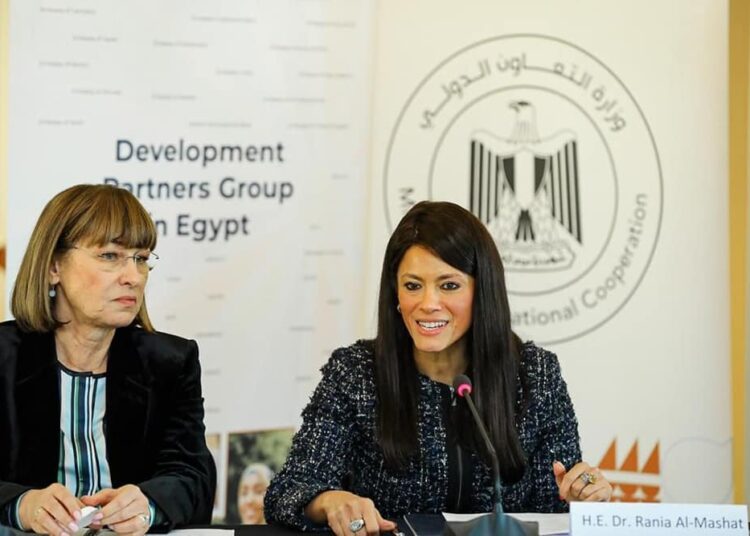Egypt’s Minister of International Co-operation Rania el-Mashat held a multi-stakeholder platform meeting on Sunday with UN Resident Coordinator in Egypt Elena Panova and Jason Taylor, who is acting Mission Director for the United States Agency for International Development (USAID) in Egypt.
The meeting is part of a series of joint strategic dialogues between the Ministry of International Co-operation and the Development Partners Group (DPG) in Egypt, headed by the United Nations and USAID.
The DPG in Egypt is a gathering of multilateral and bilateral development partners who work in partnership with Egypt to cooperate in support of development efforts.
Discussions covered the latest developments with regard to the ongoing partnership for green projects in the Country Platform Nexus of Water, Food and Energy (NWFE) Programme, as well as NWFE+ which incorporates transport.
The multi-stakeholder platform was held with the participation of over 30 multilateral and bilateral development partners and the technical teams of the Ministry of International Cooperation.
The minister reviewed progress in mobilising various financing mechanisms for the NWFE projects, referring to the plan for a tight governance structure and swift political leadership directives for the transition from pledges to implementation.
The minister stressed the importance of multi-stakeholder platforms as the tools to maximise the effectiveness of development co-operation.
The most recent one on NWFE was held in co-operation with USAID and the UN within the DPG to strengthen co-operation with NWFE and NWFE + projects, el-Mashaat said.
The minister also referred to the joint political declaration issued by Egypt, Germany and the US during COP27, reflecting the magnitude of international support for the NWFE programme as a model for national platforms to stimulate climate action and highlight achievements through joint co-operation.
NWFE includes nine projects with investment of $14.7 billion, as energy pillar includes a mega-project to replace conventional power stations with facilities fuelled by renewable at a cost of $10 billion, the minister said.
Food security depends on five plans: Adaptation of Crop Production in the Nile Valley and Delta, Adaptation of Northern Delta Affected by Rising Sea-level, Resilience for Most Vulnerable and Marginal Regions, On-farm Irrigation of Old Land, and Establishing an Early Warning System with a total investment of $3.35 billion.
As for water supplies, three projects have been set up with investments of $1.35 billion: Desalination Using Renewable Energy, Scaling-up Solar Pumps for Irrigation, and Improving Agricultural Climate Resilience by Modernising On-Farm Practices project.
The European Investment Bank (EIB), which is the main development partner in the NWFE+ programme, expressed full support, based on the main partnership with Egypt for more than 40 years, in addition to bank participation in supporting the water, food and energy sectors.
The Islamic Development Bank (IsDB) said: “We are pleased with the partnership with Egypt in the NWFE programme, and we have already started discussions with other development partners to contribute to the food and water pillars within the programme to enhance agricultural development and adaptation to climate changes.”






Discussion about this post